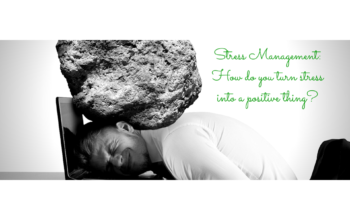Answer these questions for yourself and answer them honestly. There is no judgement to be passed here. The only one to benefit from your honesty is YOU!
Have you ever woken up and cursed your stars for having to get to work?
Do you feel tired the instant you start to work?
Are you always tired when you are at work?
Have you been experiencing mysterious aches and pains?
Has your appetite gone down?
Do your tasks at work no longer inspire or even interest you?
Are you irritable and annoyed with your co-workers at all times?
If you answered emphatically in a yes to 3 or 4 of the 7 questions above, then you are stressed.
Work and stress are synonymous to one another these days. With the growing challenges in the environment that your organization functions in along with the challenges growing in the internal environment of the organization, you are bound to feel the pressure to perform. This pressure to do well turns into stress when you begin to feel like you may not be able to cope with it all. And stress makes it presence felt in the form of psychical, psychological and behaviour changes and reactions that can be considered disorders too. That is when it starts to affect our performance as employees and individuals.
When is stress actually good for you?
Based on the situation that we are in, we all experience positive stress and negative stress. Positive or optimal stress does exist and it is mix of the excitement and nervousness that comes with anything new. This is the kind of stress that we all thrive under. Competition and sorrows or challenges also add to positive stress and push forward. The lack of sufficient stress of this nature tends to depress us leaving us bored or dejected. Negative stress is when you begin you hate what you are doing.
The goal, therefore needs to be; how do you manage stress and make it work for your advantage! The right question is “what is the optimal amount of stress for me?”
Optimal Amount of Stress for ME
When the stress levels stay within the limits of positive stress, it is considered as optimal stress. And this level is different for every single person. As individuals, we all have different wants and needs. The same way we all also have different things that make us sad. Stress is also the same equation. What one person finds to be the optimal level of stress may be too much or too little for another.
The only way to identify your own optimal levels is by understanding when you shifted from positive levels to the indicators of negative stress mentioned before.
Stress and Burnout
Being under negative stress over a period of time leads to Burnout.
Burnout is the death of motivation or incentive as a result of the death in cause or failure of relationship as a result of expectations not being met. Burnout results in exhaustion that is both physical and mental, lowered immunity, withdrawal from personal relationships and work too. All of these are intensified symptoms of stress, when you pay close attention to it. Leaving aside the obvious health concerns that come with burnout, there are some changes in how you look at life too. The individual becomes a lot more pessimistic.
So what can you do about it?
Identify the stressors at work
Does your work come with a lot of responsibilities? This could be a cause of stress. Noisy environment or even interpersonal issues can be a cause of stress at work.
Audit the stressors
Separate the stressors that you can control from the ones that you cannot.
Make an action plan
Now that you have your optimal stress level and the causes of your stress, make a detailed plan to manage stress and achieve your targets.
Manage time at work
Time or rather the lack of it is root for all stress at work. Train yourself to be more productive in the same time to reduce your stress levels.
Prepare a to-do work
A make list with 3 tiles. Must do, should do and want to do. Prioritize and delegate what you can. Remember no one can do everything in one day.
Pace your work
Everyone has certain phase during the day when they are most productive and phases when they don’t do anything productive. This cycle is called the ultradian rhythms. Identify your cycle and use the down times to do the less intensive work.
Use practical stress management techniques
Use techniques like deep breathing and short breaks etc. to manage stress.
Every job is stressful but looking at the positives and managing stress, we can live a happier and productive lives.


